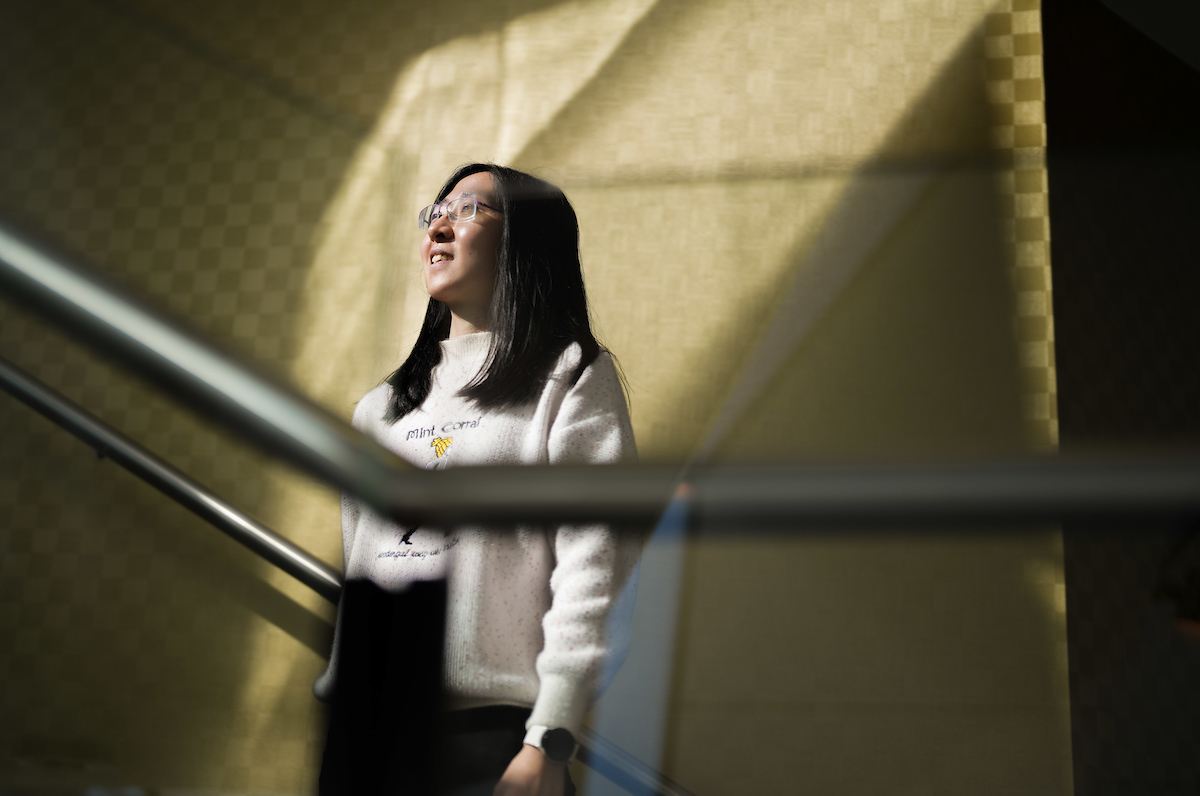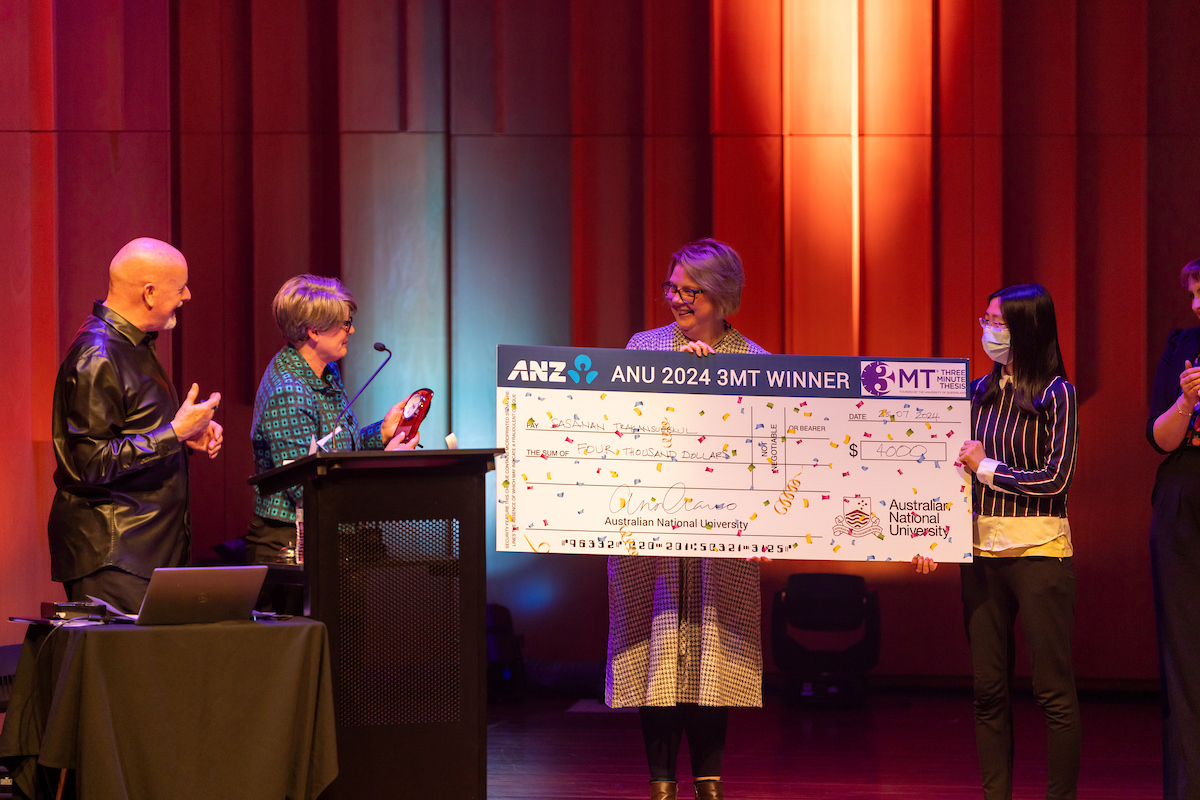Owning the spotlight: What I learned from doing the 3MT
This student blog is written by Sasanan (Sand) Trakansuebkul, PhD student from the Fischer Group and winner of the 2024 ANU 3-Minute Thesis Competition.
For three minutes, you’re in the spotlight, cameras rolling, 500 pairs of eyes glued to you. It’s nerve-wracking for anyone, especially for a shy, introverted scientist like me. But if I can do it, so can you, especially when there’s a $4,000 prize on the line.
Here’s what I learned from the experience, chatting with others, and attending the 3MT workshops by Simon Clews (highly recommend, can’t stress enough how helpful they were).

Drafting your talk
Start with a hook. A shocking statistic, a thought-provoking question, an emotional story, or a bit of humour. Pull people in and leave them wanting more. This isn’t a compulsory lecture; people can tune out. You’ve got to earn their attention.
End with a bang. Leave your audience with something memorable — a full-circle moment, a powerful image, or a line that sticks.
Know your audience. You’re speaking to a general crowd, not world-renowned experts. Avoid jargon. If you need to use technical terms, explain them clearly or use analogies. Don’t dumb it down, just make it accessible.
Stick to one key message. It’s a three-minute pitch—not a thesis. You can’t cram in every cool detail about protein X. If your brother can’t sum up what you do in one sentence, it’s probably too much.
Tell a story. Connect with your audience, engage them, and make your talk memorable.
Humour helps. If you can sneak some in, do it, or tap into emotions.
Watch and learn by checking out past 3MT talks, TED Talks, even stand-up comedy. Note what works and how you can borrow those techniques.
Getting feedback
Once you have a draft, get as much feedback as you can. Ask people outside your field, those within it, your family, your supervisor. But beware the curse of knowledge — you’re likely assuming things are obvious when they’re not. Choose friends who’ll tell you honestly where they got confused or tuned out.
Rehearsing and delivery
Body language matters. Use gestures, vary your tone and expressions, and treat your voice like an instrument. I struggled here, but my friend Arash recommended a PowerPoint practice tool that tracks speed and tone, which was super useful.
Be expressive. Faster speech shows excitement, slower speech or pauses highlight importance. I learned this the hard way — I caught COVID-19 a week before the final. I had to rehearse silently in my head just to save my voice.
Record yourself — I know, it’s cringey. Record audio-only, video-only without sound, and both together.
- With audio only, listen for fillers like “um” and “er.”
- With video only, watch your body language — are you open or closed off? Fidgety? Pacing like a nervous Nelly or stuck like a statue?
- Both together, do your gestures match your words? Talking about something sad with a slow, solemn voice and slumped shoulders? Choreograph your movements as well as your speech. Your body is your prop, use it!
Be yourself, but as Simon puts it, “dial it up to 110 percent.” Acting is exhausting, so just be a slightly more exaggerated version of yourself.
Speak clearly. Your accent doesn’t matter; clarity does. Big mouth movements help. Practice tongue twisters like “she sells seashells by the seashore.”

Practising anywhere
Practice makes perfect. Take a picture of your script with your phone so you can practise anywhere, coffee queue, walking the dog, in the shower.
Shower practice is surprisingly effective. Stick your script on the shower glass and rehearse out loud. Bonus: by the time you’re done, you’ve definitely left the conditioner in long enough.
Prepare for anything. I practised with Linkin Park’s Numb blasting in my headphones and a chaotic shopping mall ambience — crying babies and all — playing on YouTube. You never know what might throw you off.
On the day
If you’re like me, you’ll be a nervous wreck. Adrenaline is not your friend — pounding heart, shallow dog-like panting, that funny flutter in your stomach. You’re stuck in fight-or-flight mode.
So, do some light exercise. Jump in place or pace like a maniac (don’t worry, everyone else will be too busy pacing too). Get rid of that extra adrenaline and focus on deep breathing. It helps calm you down.
Don’t be afraid to make mistakes. If something goes wrong, just roll with it. I stumbled during finals, fought off coughs, forgot my lines, and improvised as I went. Most of the time, the audience won’t even notice unless you stop and say “sorry” or “oops,” so just keep going. Although for my case I wasn’t exactly subtle — but I still made it through.
Final thoughts
Winning 3MT was amazing — but even more valuable was what I learned along the way: how to tell my story. And most importantly? Enjoy it. You’ve worked hard, your research matters, and for three minutes, the spotlight’s yours — so own it.
Find out more about the ANU Three Minute Thesis Competition.



